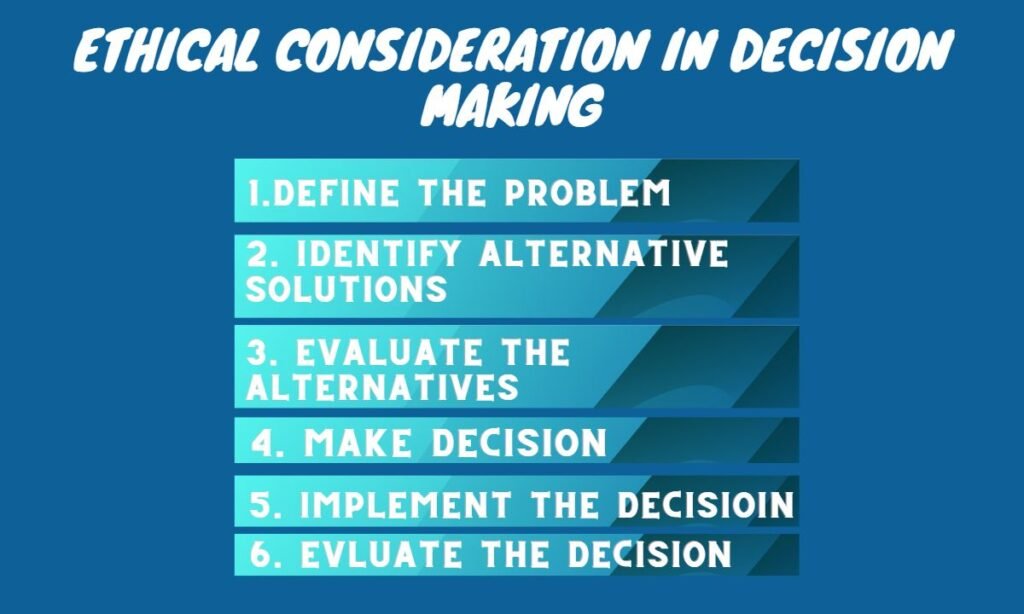In today’s complex business world, decision-making is a critical part of running a successful organization. However, the ethical considerations that come with decision-making are often overlooked or not given enough weight. Ethical consideration in decision making is essential because it affects not only the outcome of the decision but also the reputation of the organization.
In this blog post, we will explore the importance of ethical considerations in decision making and how they can impact an organization. We will discuss the ethical principles that should guide decision-making, and we will provide practical examples of how organizations can incorporate these principles into their decision-making processes. By the end of this post, you will have a better understanding of how to make ethical decisions that are beneficial to both your organization and society as a whole. So, let’s dive in!
Important Topic: Ethics VS Morals
What is an Ethical Decision
An ethical decision is a choice made by an individual or a group that takes into consideration the moral principles and values that govern human behavior. It involves considering what is right or wrong, fair or unfair, and just or unjust, and making a decision that is consistent with these principles and values.
An ethical decision may involve assessing the potential impact of the decision on others, as well as weighing the consequences of various options. It may also involve considering the obligations and responsibilities that an individual or group has to others, such as to act in their best interests or to protect their rights.
6 Step For Ethical Decision Making

It is important for any individual or corporation to consider steps for ethical decision making. These steps are also widely known as processes for ethical decision making.
1. Define the Problem
The first step in ethical decision-making is to identify the issue or problem that requires a decision. It’s essential to be clear about what the problem is, its context, and potential consequences. This step requires individuals to gather as much information as possible about the situation to understand the root cause of the problem. It is also crucial to identify who the stakeholders are and how they might be impacted by the decision.
2. Identify available alternative solutions to the problem
Once the problem is defined, the next step is to brainstorm and identify all possible alternative solutions. This step involves gathering information and considering all potential options. It’s important to consider the feasibility of each alternative and assess the risks and benefits of each option. It may also be helpful to consult with others who have relevant expertise or experience in the matter.
3. Evaluate the identified alternatives
The third step is to evaluate each alternative in terms of its potential outcomes. This step requires individuals to weigh the pros and cons of each alternative and consider the ethical implications of each option. It’s essential to consider how each alternative aligns with one’s values and principles and how it might affect the stakeholders. It may also be helpful to consider the long-term consequences of each alternative.
Know About: Corporate Social Responsibility
4. Make the decision
After evaluating each alternative, it’s time to make a decision about which alternative to choose. The decision should be based on the ethical implications of each alternative and must align with one’s values and principles. It’s important to take the time to consider all aspects of the problem and make a decision that reflects one’s integrity.
Daily Knowledge : Cyber Security Vs Cloud Security
5. Implement the decision
Once the decision is made, it’s time to take action and implement the chosen alternative. This step requires individuals to plan and execute the decision effectively. It’s important to communicate the decision to all relevant stakeholders and ensure that they understand what needs to be done. It may also be necessary to make adjustments to the implementation plan as circumstances change.
6. Evaluate the decision
Evaluate the decision: The final step is to evaluate the decision made in step four and the implementation process in step five. Individuals must assess whether the decision was effective in addressing the problem and whether the implementation process was successful. This step helps individuals learn from the experience and make better decisions in the future.
How to: Ways to Improve Business Ethics
In conclusion, ethical considerations play a crucial role in decision-making processes, both in personal and professional contexts. Making ethical decisions requires individuals to assess the potential consequences of their choices, consider the impact on others, and weigh conflicting values and interests. By taking into account ethical principles such as honesty, integrity, and respect for others, decision-makers can ensure that their choices are in line with their values and beliefs.
Additionally, ethical decision-making can help promote trust, fairness, and accountability, which are essential for building strong relationships and maintaining a healthy society. Ultimately, by prioritizing ethical considerations in our decision-making processes, we can create a better world for ourselves and for future generations.
FAQs
What is ethical decision-making?
Ethical decision-making involves considering the moral implications of a situation and making choices that are consistent with ethical principles and values.
Why is ethical decision-making important?
Ethical decision-making is important because it helps ensure that individuals and organizations act in a morally responsible manner. It can also help promote trust, fairness, and accountability, which are essential for building strong relationships and maintaining a healthy society.
What are some common ethical principles that guide decision-making?
Common ethical principles that guide decision-making include honesty, integrity, respect for others, justice, and fairness. These principles help individuals evaluate the moral implications of a situation and make choices that align with their values and beliefs.
What are some challenges to ethical decision-making?
Challenges to ethical decision-making may include conflicting values or interests, ambiguity or uncertainty about the consequences of a decision, and pressure to prioritize short-term gains over long-term sustainability.
How can individuals and organizations promote ethical decision-making?
Individuals and organizations can promote ethical decision-making by fostering a culture of ethical behavior, providing training and support for ethical decision-making, and establishing processes for accountability and transparency. Additionally, seeking input from diverse perspectives and considering the impact on stakeholders can help ensure that decisions are fair and responsible.





